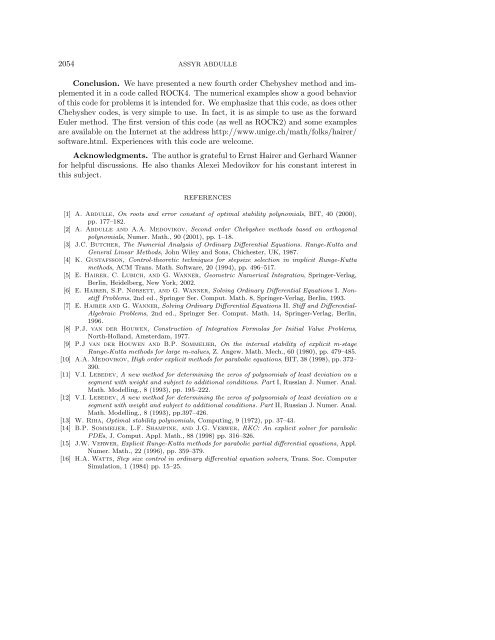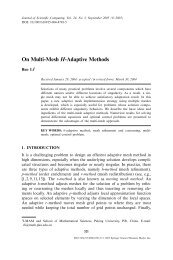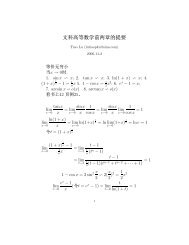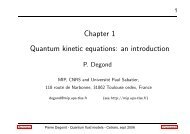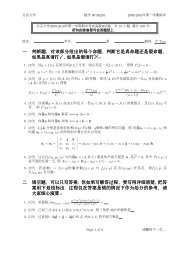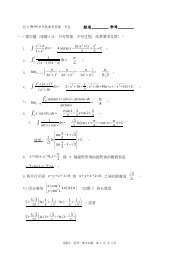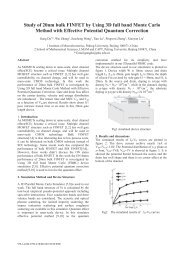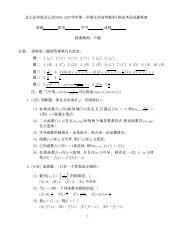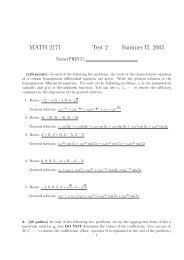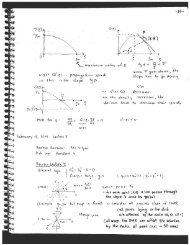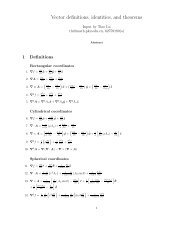fourth order chebyshev methods with recurrence relation
fourth order chebyshev methods with recurrence relation
fourth order chebyshev methods with recurrence relation
Create successful ePaper yourself
Turn your PDF publications into a flip-book with our unique Google optimized e-Paper software.
2054 ASSYR ABDULLE<br />
Conclusion. We have presented a new <strong>fourth</strong> <strong>order</strong> Chebyshev method and implemented<br />
it in a code called ROCK4. The numerical examples show a good behavior<br />
of this code for problems it is intended for. We emphasize that this code, as does other<br />
Chebyshev codes, is very simple to use. In fact, it is as simple to use as the forward<br />
Euler method. The first version of this code (as well as ROCK2) and some examples<br />
are available on the Internet at the address http://www.unige.ch/math/folks/hairer/<br />
software.html. Experiences <strong>with</strong> this code are welcome.<br />
Acknowledgments. The author is grateful to Ernst Hairer and Gerhard Wanner<br />
for helpful discussions. He also thanks Alexei Medovikov for his constant interest in<br />
this subject.<br />
REFERENCES<br />
[1] A. Abdulle, On roots and error constant of optimal stability polynomials, BIT, 40 (2000),<br />
pp. 177–182.<br />
[2] A. Abdulle and A.A. Medovikov, Second <strong>order</strong> Chebyshev <strong>methods</strong> based on orthogonal<br />
polynomials, Numer. Math., 90 (2001), pp. 1–18.<br />
[3] J.C. Butcher, The Numerial Analysis of Ordinary Differential Equations. Runge-Kutta and<br />
General Linear Methods, John Wiley and Sons, Chichester, UK, 1987.<br />
[4] K. Gustafsson, Control-theoretic techniques for stepsize selection in implicit Runge-Kutta<br />
<strong>methods</strong>, ACM Trans. Math. Software, 20 (1994), pp. 496–517.<br />
[5] E. Hairer, C. Lubich, and G. Wanner, Geometric Numerical Integration, Springer-Verlag,<br />
Berlin, Heidelberg, New York, 2002.<br />
[6] E. Hairer, S.P. Nørsett, and G. Wanner, Solving Ordinary Differential Equations I. Nonstiff<br />
Problems, 2nd ed., Springer Ser. Comput. Math. 8, Springer-Verlag, Berlin, 1993.<br />
[7] E. Hairer and G. Wanner, Solving Ordinary Differential Equations II. Stiff and Differential-<br />
Algebraic Problems, 2nd ed., Springer Ser. Comput. Math. 14, Springer-Verlag, Berlin,<br />
1996.<br />
[8] P.J. van der Houwen, Construction of Integration Formulas for Initial Value Problems,<br />
North-Holland, Amsterdam, 1977.<br />
[9] P.J van der Houwen and B.P. Sommeijer, On the internal stability of explicit m-stage<br />
Runge-Kutta <strong>methods</strong> for large m-values, Z. Angew. Math. Mech., 60 (1980), pp. 479–485.<br />
[10] A.A. Medovikov, High <strong>order</strong> explicit <strong>methods</strong> for parabolic equations, BIT, 38 (1998), pp. 372–<br />
390.<br />
[11] V.I. Lebedev, A new method for determining the zeros of polynomials of least deviation on a<br />
segment <strong>with</strong> weight and subject to additional conditions. Part I, Russian J. Numer. Anal.<br />
Math. Modelling., 8 (1993), pp. 195–222.<br />
[12] V.I. Lebedev, A new method for determining the zeros of polynomials of least deviation on a<br />
segment <strong>with</strong> weight and subject to additional conditions. Part II, Russian J. Numer. Anal.<br />
Math. Modelling., 8 (1993), pp.397–426.<br />
[13] W. Riha, Optimal stability polynomials, Computing, 9 (1972), pp. 37–43.<br />
[14] B.P. Sommeijer, L.F. Shampine, and J.G. Verwer, RKC: An explicit solver for parabolic<br />
PDEs, J. Comput. Appl. Math., 88 (1998) pp. 316–326.<br />
[15] J.W. Verwer, Explicit Runge-Kutta <strong>methods</strong> for parabolic partial differential equations, Appl.<br />
Numer. Math., 22 (1996), pp. 359–379.<br />
[16] H.A. Watts, Step size control in ordinary differential equation solvers, Trans. Soc. Computer<br />
Simulation, 1 (1984) pp. 15–25.


